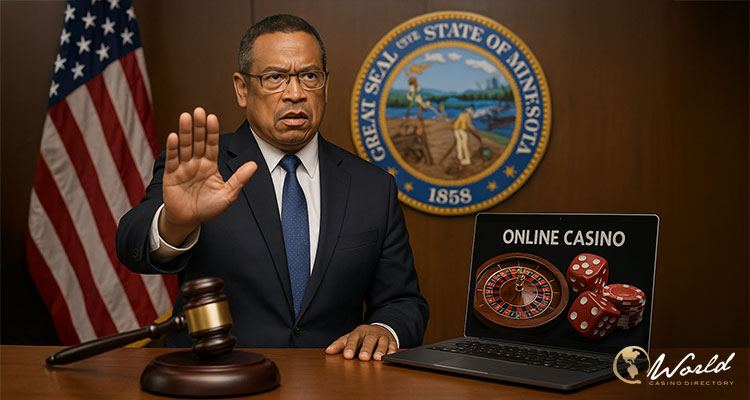Minnesota Attorney General Keith Ellison has renewed his efforts to stop unlicensed gambling platforms from operating in the state, reissuing cease-and-desist orders to 14 online casinos and sportsbooks that continue to target Minnesota residents. The action represents a firm stance against offshore and sweepstakes-style operators that, according to Ellison, are in direct violation of state gambling and consumer-protection laws.
The latest orders, announced Wednesday, follow a previous set of warnings sent in June by the Minnesota Department of Public Safety’s Alcohol and Gambling Enforcement Division. Those initial letters instructed each company to cease offering online gambling and sweepstakes casino services to Minnesotans. However, after no compliance was achieved, Ellison’s office escalated enforcement by sending a second round of formal notices.
“Online platforms offering sportsbooks and casino games run by out-of-state and overseas operators may make it look as though online gambling is legal and safe in Minnesota, but let me be clear: it is not,” said Ellison in an official statement. “Trying to rebrand poker chips as virtual currencies does not change the fact that these online gambling operations are unlawful.”
Cease-and-Desist Orders Sent to 14 Operators
The cease-and-desist notices were directed to a mix of online sweepstakes casinos and offshore gambling sites: VG LuckyLand, Zula Casino, Fortune Coins, BetAnySports, BetUs, XBet, BetNow, BetWhale, EveryGame Sportsbook, BetOnline, Slotsandcasino, Bovada, MyBookie.com, and Sportsbetting.com.
Each platform has been ordered to confirm in writing that they have stopped operating within Minnesota’s borders. They must also cease all related marketing and transactional activity by December 1 or face further legal action. The letters warn of potential civil penalties of up to $25,000 per violation, as well as possible restitution and injunctions should the operators continue defying state law.
The two types of letters issued by Ellison’s office distinguish between traditional online gambling sites—those that offer wagering on sports, poker, and casino-style games—and social sweepstakes casino sites that operate through virtual coin systems. The second category, which includes sites like LuckyLand and Fortune Coins, uses a “two-coin” model that lets consumers purchase virtual packages containing “gold coins” for play and “sweeps coins” redeemable for cash or prizes.
According to the Attorney General’s office, this setup blurs the line between gaming and gambling and often misleads consumers into believing the activity is lawful. Both letters cite violations under Minnesota Statutes §§ 609.75–609.76 and § 325F.69, which govern illegal gambling and deceptive trade practices.
Minnesota’s Strict Gambling Framework
Under Minnesota law, online gambling—including casino games and sports betting—remains prohibited. Legal gambling in the state is limited to tribal casinos, horse racing, the state lottery, and charitable gaming. Although the 2018 U.S. Supreme Court decision permitted states to legalize online sports betting, Minnesota’s legislature has not yet enacted such legislation.
“Illegal online casinos and sweepstakes sites make big promises but deliver only risk to Minnesota consumers,” said Bob Jacobson, Commissioner of the Minnesota Department of Public Safety. “Most are based outside the U.S. to avoid laws, regulation, and enforcement measures. There’s no accountability, no protection for players, and no way to know if the betting will be run fairly.”
Ellison emphasized that these operators exploit legal loopholes to lure players into unregulated environments that lack proper oversight. Many of the targeted sites, he noted, fail to enforce age restrictions or guarantee payouts, putting Minnesota consumers at serious risk.
Wider Nationwide Action Against Offshore Sites
Minnesota’s move aligns with a growing national effort to combat unlicensed gambling operations. Earlier this year, regulators in Louisiana, Mississippi, and West Virginia issued similar cease-and-desist letters to several of the same brands now named in Minnesota’s action. In those states, officials cited the sale of “virtual coin” packages that could be redeemed for money or prizes as clear violations of gambling statutes.
The Washington State Gambling Commission also took enforcement steps in September against Bovada, MyBookie, and BetOnline for continuing to operate illegally after being warned. Other agencies, including the Massachusetts Gaming Commission, the Arizona Department of Gaming, and the Michigan Gaming Control Board, have launched parallel actions against offshore or sweepstakes casinos.
While Minnesota’s latest campaign did not extend to prediction markets such as Kalshi or Polymarket, Ellison’s office has joined 35 other state attorneys general in an ongoing effort to classify such platforms as gambling operations subject to state laws.



